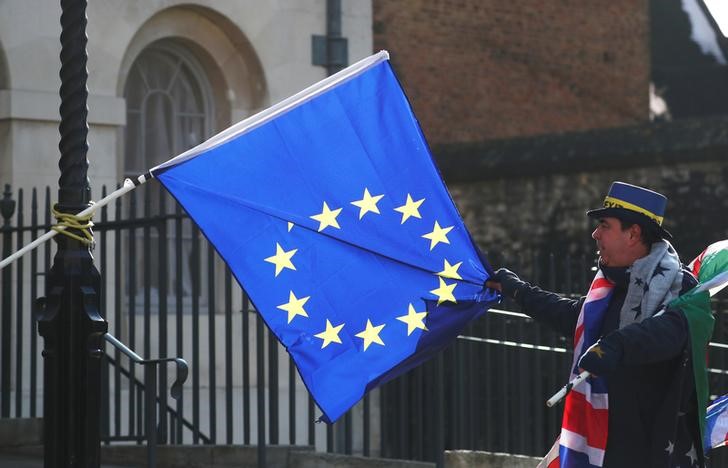 © Reuters. An anti-Brexit demonstrator waves EU, Union and Welsh flags opposite the Houses of Parliament in London
© Reuters. An anti-Brexit demonstrator waves EU, Union and Welsh flags opposite the Houses of Parliament in LondonBy Gabriela Baczynska
BRUSSELS (Reuters) – The European Union could offer Britain a closer relationship after Brexit if Prime Minister Theresa May decides to stay in the bloc’s customs union, diplomats said.
The EU hopes London could change its stance on what ties it wants after Brexit after Britain’s upper house of parliament challenged the government on a key bill relating to May’s plan to quit the customs union.
Diplomats and officials in Brussels cite little progress in Brexit negotiations since the last meeting of all EU leaders in March. Back then, May won the green light from her 27 colleagues to start talks about the two sides’ future relationship.
The impasse is largely because Brussels and London have so far outlined conflicting stances on their new deal after Brexit.
Britain says it will be dropping out of the EU’s single market and customs union after Brexit. The EU says these red lines mean the only possible framework for future cooperation between Britain and the bloc is a trade deal.
That, in turn, falls short of London’s ambition for a broad, bespoke deal.
But the House of Lords last week challenged May’s refusal to remain in a customs union with the EU after Brexit, and the lower chamber is expected to hold a follow-up vote next month.
The Lords want to oblige the government to report on what steps it had taken to negotiate a customs union and May is now gauging the support of her divided Conservative party to any change of plans.
“A customs union would change the dynamic between Britain and the EU. It would show that the British really do want to stay close to Europe,” a senior EU diplomat said in Brussels. “If they did do that, I think the EU could be quite responsive.”
The bloc’s Brexit negotiator Michel Barnier has already suggested just that in his comments at the Hanover trade fair earlier this week.
“If the UK’s red lines were to evolve, the (European) Union would be prepared to reconsider its offer. We are flexible, never dogmatic. We are open for business,” Barnier said.
“It is now up to the UK to come up with its vision for the future, which should confirm the UK’s red lines or adapt them.”
The EU parliament’s Brexit point man Guy Verhofstadt said he was following the British parliamentary votes closely.
Asked about the prospect of the government changing its mind on leaving the customs union, May’s spokesman said: “The Prime Minister is absolutely clear: we are leaving the customs union and will be free to strike our own trade deals around the world.”
EU diplomats don’t expect the next negotiating round due on May 2-4 to bring much of a breakthrough, with one saying both sides were holding their positions to see who blinks first.
“For now it’s a bit of a deadlock. We are sitting on our hands and waiting for Britain to clarify – read: change – its red lines,” the EU diplomat said.
“Otherwise, not much can move for now. So the next month should be relatively quiet and then we’ll get some drama building up a new before the next EU summit in late June.”
While in the EU’s political hub Brussels everyone sees London staying in a customs union as the most pragmatic and effective solution, the irony of such a move would not be lost.
“We shall hope they stay in the customs union. But then again, why bother with Brexit at all?,” a third diplomat said.
Fusion Media or anyone involved with Fusion Media will not accept any liability for loss or damage as a result of reliance on the information including data, quotes, charts and buy/sell signals contained within this website. Please be fully informed regarding the risks and costs associated with trading the financial markets, it is one of the riskiest investment forms possible.
Source: Investing.com



























